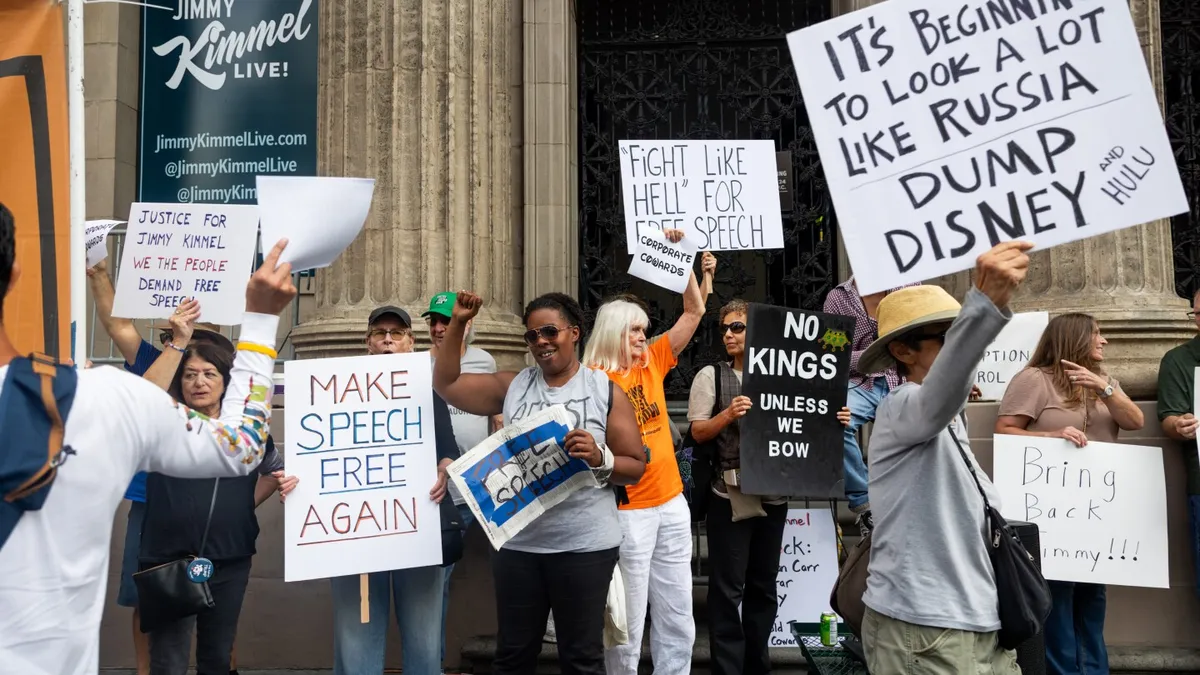
This week marked a significant resurgence of cancel culture as ABC made the controversial decision to remove Jimmy Kimmel from his longstanding late-night slot. This drastic action was triggered by comments Kimmel made regarding the political ramifications following the assassination of Charlie Kirk. The fallout from this incident has ignited a heated debate about free speech in America, revealing a new fault line particularly among conservative audiences.
Many commentators assert that the circumstances surrounding Kimmel's removal are less about a theoretical discourse on free speech and more about strategic maneuvering. Some believe the current administration sought a rationale to silence a vocal critic, with Disney seemingly complicit for reasons that may have little to do with Kimmel himself. As the situation evolves and backlash intensifies, ABC finds itself ensnared in a precarious dilemma, caught between a rock and a hard place.
In an analysis by Michael McCarthy from FrontOfficeSports.com, the complexities of Disney's position are laid bare. Citing unnamed sources, he notes that Disney may soon face a pivotal choice between continuing its partnership with Kimmel or maintaining its tentative media alliance with the NFL. Recently, ESPN and the NFL announced a prospective deal that, once finalized, would give ESPN control over several assets, including the NFL Network, while also transferring 10 percent of ESPN's equity to the league.
While this deal is still pending regulatory approval, both ESPN and the NFL have expressed confidence that it will ultimately go through. This assurance stems from a mutual commitment to navigate the situation delicately, doing what is necessary to secure favor from all involved parties. However, managing such a deal is fraught with challenges, especially considering Disney's pre-existing tensions with both the league and the administration.
If Disney decides to reinstate Kimmel, it risks jeopardizing the entire NFL partnership, which could have lasting repercussions on its broadcasting rights. Conversely, choosing to dismiss Kimmel might increase the likelihood of the NFL deal receiving the necessary approvals. This predicament raises a crucial question: What does Disney truly prioritize? The return of Kimmel or the valuable partnership with the NFL that could ensure its position in the broadcast landscape for years to come?
Adding another layer of complexity, if Disney begins to feel regret over its decision to partner with the NFL, bringing Kimmel back could serve as a convenient exit strategy. The scrutiny surrounding ESPN's management of the NFL is already palpable. For instance, ESPN has been unfairly blamed for the addition of commercials to the NFL RedZone, showcasing how public perception can often diverge from reality. This ongoing criticism makes it reasonable to question whether Disney will find the constant scrutiny worth the potential benefits.
The undeniable reality for Disney is that a critical decision looms on the horizon. Retaining Kimmel could mean sacrificing the NFL deal, while letting him go might enhance the chances of the transaction receiving the necessary blessings from regulatory bodies. Ultimately, some may argue that the decision regarding Kimmel should hinge solely on the ethical implications of keeping or letting him go. However, in the world of large corporations with intricate revenue streams, such considerations are rarely the primary focus of business analysis.